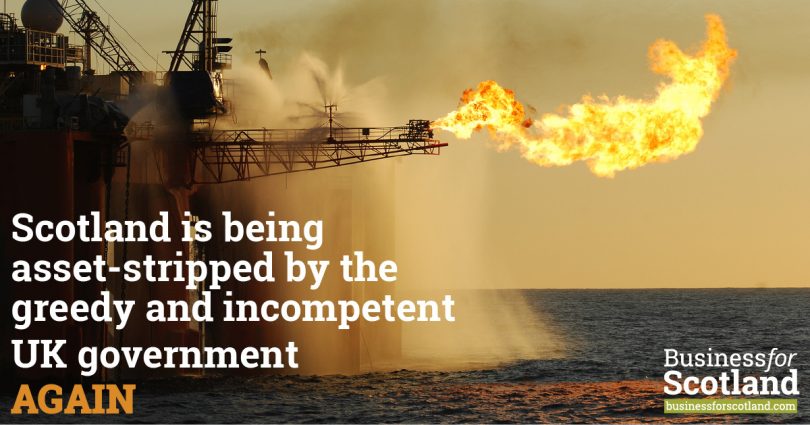Much of the response to the decision to give the green light to Rosebank oil field has focused on the climate change issues. Less has been said about the fact that the news will mean Equinor pays billions LESS in windfall tax.
That is because of a loophole in the UK Government’s windfall tax that means new exploration gets a tax break.
Developing Rosebank means energy giant Equinor can write off more than 90p in every pound they spend, so the new licence will reduce the company’s overall taxable profits substantially.
Writing in the Guardian, Green MP Caroline Lucas explained: “Ministers will herald ‘private sector investment’ by licensing this field to Equinor. What they might not tell you is that the Treasury is gifting this fossil fuel giant – which recently announced record 2022 global profits of £62bn – a tax break straight from the public purse worth a reported £3.75bn. This giveaway is the result of an egregious loophole in the windfall tax, meaning that for every £100 fossil fuel companies plunge into yet more climate-wrecking oil and gas, they can claim £91.25 back from the Treasury.”
The oil and gas from Rosebank won’t lower Scottish consumers’ bills
Rosebank’s reserves are 90 percent oil which the operator, Equinor, has said “will be sold on the open market, and the most likely destination for that oil is the continent of Europe”. That means the oil will not impact the price that UK consumers pay for fuel or for gas – which is only a small part of the reserve.
“Exploiting Rosebank’s reserves will not have an impact on UK fuel prices, nor will it make us more energy independent,” former Conservative energy minister Chris Skidmore wrote in the Scotsman last week.
It will also take several years to come through – when Europe and many other countries will be moving away from fossil fuels. Opening Rosebank’s reserves without using carbon capture muddies the waters.
Missed opportunity to develop carbon capture technology
An opportunity is being missed to develop Scotland’s carbon capture economy. New developments in Norwegian waters must include carbon capture. But that won’t happen when it comes to Rosebank – because it is all under the control of the UK and they have not mandated oil companies to do this.
That is a watershed moment – and the UK is on the side of dirty, outdated methods. Companies wanting to create carbon capture and storage facilities in the UK are still waiting on promised funding mechanisms to stimulate investment.
Scotland’s disused oil fields could become an asset when carbon capture is developed. Storage of captured carbon depends on identifying suitable locations, and the North Sea’s former oil and gas fields are believed to meet many of the geological criteria
Another bonanza for the Norwegian Sovereign Wealth Fund.
Many independence supporters will find it surprising that another 300 million barrels of oil will be coming out of Scotland’s oil field after being told so often back in 2014 that the oil was about to run out. They will also find it painfully ironic that all the profits will go to the Norwegian Sovereign Wealth Fund.
The fact that Rosebank is being developed by the Norwegian state oil company Equinor
is a reminder that successive UK governments – both Labour and Conservative – failed to invest any of Scotland’s £300 billion oil revenues into developing Scotland’s renewable energy manufacturing.
Now Denmark and Norway are world leaders in renewables while the Scottish government is able to invest comparatively tiny sums and cannot give the market signals that are needed. For example, no offshore wind bids were received for Scotland’s waters this year after the Westminster government set the funding bar too low.
Sending out a bad signal about the UK’s climate change ambitions
The world has lost faith in the UK’s green ambitions. This is evident in the price paid by businesses in the UK for carbon credits. That is a system intended to regulate pollution where polluters have to buy a sort of licence to emit CO2 – the number of carbon credits available is supposed to reduce over time, which makes them more expensive and means traders can buy and sell them at a profit. But the Westminster government has been issuing lots more of these and the price in the UK has collapsed to less than half the level in the EU.
The ‘Lex’ investor opinion column in the FT wrote: “The obvious implication of current prices is that the market no longer believes the UK will stick to midterm objectives. That is worrying. Low carbon prices harm the UK economy in the long run.”
Scotland has had enough of being asset-stripped by a greedy and incompetent UK government
Licensing the Rosebank oilfield is an act of desperation. The main economic advantage the UK Government will get is a potential boost to the current account which is being hard hit by Brexit – a deficit in the current account has led to a drop in the value of the pound, raising inflation on imported goods.
The fact that it will make profit for Norway’s Sovereign Wealth Fund and not for Scotland is a bitter reminder of the past. The story could have been so very different if Scotland had been independent.
Nobody wants to see the same story being played out when it comes to Scotland’s renewable energy potential.









Why are you not mentioning the fact that, had Rosebank been in the Norwegian sector, they would be paying 50% of the value of a barrel or equivalent in petroleum tax.
You know? The one that Gideon Osborne removed in 2015. – Care to calculate the lost revenue since then?
Or how about the ” claimed” huge amount of un-taxed gas production they are predicting will go in the Frigg pipeline to St. Fergus. Where we plebs will buy it from the Norwegian state at vastly inflated market price!